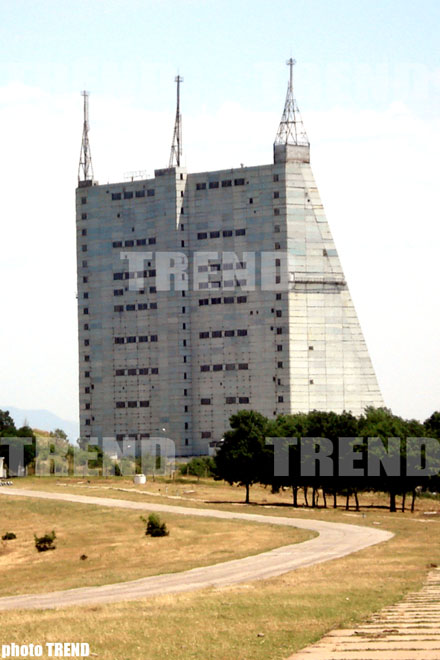Azerbaijan, Baku, September 22 / Trend , E.Tariverdiyeva /
Moscow and Washington's joint use of Russia's radar located on the territory of Azerbaijan is not question of the near future, experts say.
"The value of deploying US radar systems in the Caucasus region is questionable, as the proximity of the region to Iran makes it difficult for radar bases there to detect Iranian guided missiles in time," said Johanna Popjanevski, Deputy Director of the Institute for Security and Development Policy (Sweden).
Within the new architecture of American missile defense system in Europe, the Pentagon plans to deploy radar for early warning of missile launches in the Caucasus instead of the Czech Republic, Marine Corps General James Cartwright, vice chairman of the Joint Chiefs of Staff, said on Friday, ITAR-TASS reported. Cartwright attended a press conference held by Secretary of Defense Robert Gates to explain President Barack Obama's decision to scrap plans for anti-missile defence systems in Eastern Europe, namely Poland and the Czech Republic.
According to the General, the new architecture still envisages deployment of early warning radar, which operates in the centimeter range. "And most likely it will be done in the Caucasus," said Cartwright, without specifying where.
According to experts, now it is unlikely to confidently talk about Moscow and Washington's joint use of Gabala radar station.
According to Popjanevski, uselessness of Gabala radar base against Iranian threats was recognized by Washington already in 2007, when the US rejected Putin's offer to share the Russian-controlled radar base in Gabala.
"Any renewed plans to establish radar systems in the Caucasus are likely to be subject to the same strategic concerns in Washington," Popjanevski said.
It is too early to speak about U.S. and Russia's joint use of Gabala radar in Azerbaijan, Director of the British Transatlantic and Caucasus Studies Institute Ziba Norman said.
"It is no secret that the U.S. has long envied Russia's position in Gabala, though it is too soon to say whether this might become a site for U.S. missile defense system in the South Caucasus," Norman told Trend .
If the U.S. and Russia cooperate on missile defense, it could be pursued in a number of ways, Baker Spring, U.S. expert on missile defense system, said.
"I suspect the most likely way, if there is an agreement (which I think is far from certain), is the coordinated use of assets that are deployed by the U.S. and Russia independently," Spring, Research Fellow in National Security Policy at the Heritage Foundation, told Trend .
"I would expect Turkey and Romania to be candidates, but I would not limit it to them," he said.
According to Spring, the x-ban radar, similar to one deployed in Israel and Japan, is designed to be deployed nearer the launch point of the attacking missile than the one that would have gone in the Czech Republic. The decision about which country would host the radar has not been made, he said.
Azerbaijani Gabala Radio Location Station might be announced the potential direct for US-Russia missile defense cooperation, believes Carl Levin, U.S. Senator from Michigan.
"Gabala RLS's information would be useful to the United States, as a supplement to US existing radar capabilities for all ranges of missile defense," the senator told Trend .
This issue was added to the "National Defense Authorization Act for Fiscal Year 2010" bill which has been put on the next agenda of the US Congress.
The document Number S.1390 includes a report on potential missile defense cooperation between US and Russia on multiple military objects.
The report particularly addresses "a description of options for the sharing by such countries and organization of ballistic missile surveillance or early warning data, including data from the Russian early warning radars at Gabala in Azerbaijan, and Armavir in southern Russia or other radars, such as the United States radar proposed for deployment in the Czech Republic".
According to observers, cooperation between the U.S. and Russia and their joint use of missile defense systems depends on several factors.
The Russian administration is likely to look positively at cooperating with the US in such an initiative, Popjanevski said, adding that however, the issue is dependent on progress in the NATO-Russian relationship.
"Moscow's previous unwillingness to cooperate constructively with the alliance may cause the Pentagon to be skeptical towards cooperation with Russia on this issue," Popjanevski said.
According to U.S. expert Michael M. Gunter, President Obama's decision to scrap the proposed system in Poland and the Czech Republic is a welcomed move and it will not sacrifice any necessary US defense need and hopefully help to reassure Russia.
According to the expert, proposal by US Marine Corps General James Cartwright to locate a system in the Caucasus can make worse relations with Moscow. The US already has a system in place in Turkey, the expert said.
"Where is a similar Russian system in Mexico? Not there is it!" Michael Gunter, Professor at Tennessee Tech University, said.
The US should try to do more to cooperate with Russia, not needlessly antagonize it, the expert said.
This would indeed make things more secure all around, he said.
"Indeed, the late George Kennan, the father of the containment doctrine, declared that the worse mistake the US made after the Cold War was to antagonize Russia and move NATO up to the Russian border. Let's be smart," Gunter said.
V.Zhavoronkova, E.Ostapenko, N.Bogdanova contributed to the article.
Do you have feedback? Contact our journalist at: [email protected]






